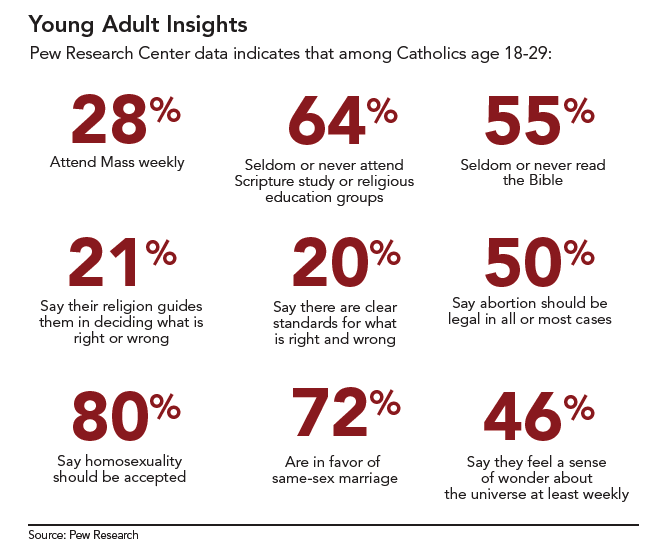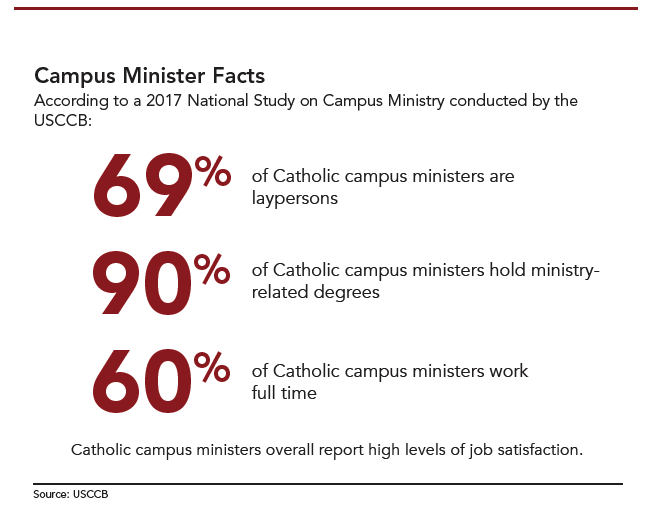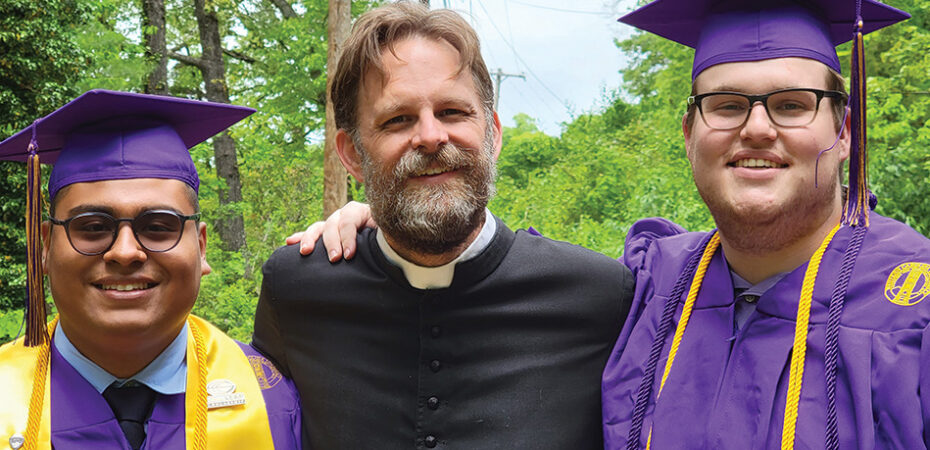Mission Stations: College Campus Ministry
How deacons can cast out a net to evangelize college students
Deacon Matthew Newsome 1
As a deacon, I feel very blessed that my ministerial assignment is also my full-time job. I was ordained in 2018, but since 2008 I have served the students of Western Carolina University as a campus minister. The purpose of campus ministry is to bring the light of Christ and the pastoral presence of his Church to institutions of higher learning. Models of campus ministry vary depending on the size, character and population of the particular school. Religiously affiliated institutions typically will have in-house chaplaincy offices. At many secular schools, campus ministry is conducted as an outreach of the local parish or from campus-ministry centers located near the campus. Such centers are often named for St. John Henry Newman, who recognized a need for Catholic students attending Protestant or secular universities to be supported in their faith.
Some larger campus ministries employ a team, but most campus ministers work without staff support. A complementary model of campus ministry involves young adult missionaries who are often recent college grads themselves. Organizations such as FOCUS (the Fellowship of Catholic University Students) and the St. Paul Outreach Center assist in these efforts.
The campus on which I serve is a state university with approximately 12,000 enrolled students of which Catholics are a small minority. A house near the heart of campus has been converted into a ministry center and chapel, where I work as the sole campus-ministry professional.
A Personal History
My wife, Joannie, and I met as undergrads at WCU in 1999. She was a Catholic freshman already very active in campus ministry, and I was an unchurched senior wandering in the wilderness of heathenism. As I began to attend Mass and other activities at the ministry center with her, I was falling in love not only with my future wife but with Christ and his Church. I entered the RCIA and on Easter in the Jubilee Year 2000 received the Sacraments of Baptism, Confirmation and Eucharist. My wife and I were married later that same year.
From the start, I was filled with a desire to serve the Church from which I had received so many blessings. I pursued a Master of Theology degree from Holy Apostles College and Seminary and enrolled in the lay ministry formation program offered by our diocese. I had no plans to work in professional ministry, but wanted to be equipped to serve the Church in whatever way I could. It was during this time that I first began to discern a call to the diaconate.
Then, in 2008, I had another hallmark year. I completed my master’s, graduated from the lay ministry program and received the unexpected offer to serve as campus minister at the very same institution where my journey into the Faith began. That same year, I applied to the permanent diaconate formation program for our diocese. I was accepted for the campus-ministry position but turned down for diaconate formation. My wife and I had four very young children at the time. The formation team, in their wisdom, encouraged me to focus on my family and new job as a lay campus minister, and apply again at a later date if I still felt called. I did, and was ordained in 2018.
Serving in full-time ministry while simultaneously going through diaconal formation was a wonderful experience, providing a ready context for me to put that formation into practice.
Center of Evangelization
Campus ministry encompasses a wide range of ministerial opportunities. College students are at a critical stage in their life, a time when they are no longer dependent on Mom and Dad for their participation in the Faith. Today’s culture is no longer supportive of religious participation. Young adults practice the Faith only if they personally value it. College students must appropriate the Faith for themselves or else they will walk away from it. They need to see themselves as part of God’s story, and they need to know it is a love story.
According to data from the Pew Research Center, 36% of 18- to 29-year-olds in America claim no religious affiliation, while only 16% identify as Catholic. While the original intent of Newman Centers was to support Catholic students in particular, we cannot ignore the ever-growing number of young adults looking to find their way in life without the light of Christ.
As a campus minister, thinking about the thousands of unchurched students on my campus can be daunting. How can one person reach so many? My outreach strategy is to equip the already committed Catholic students to be evangelists to their peers. This requires them to get past the negative stereotype of evangelization many have and embrace their baptismal call to make disciples of all nations. The challenge is that many have not, until this point, been living as disciples themselves. Campus ministry must, therefore, function as a center of formation in Christian discipleship.

In 2020, the Vatican’s Congregation for Clergy issued an instruction with a lengthy title: “The Pastoral Conversion of the Parish Community in the Service of the Evangelizing Mission of the Church.” That document speaks of the need to erect “mission stations” to serve communities of the faithful outside the local parish. These mission stations, it says, “may be entrusted — where possible — to a parochial vicar, or, in a particular way, to one or more permanent deacons, who would have responsibility for them … under the responsibility of the parish priest. These centers can become missionary outposts and instruments of proximity … in a way that ensures moments of prayer and Eucharistic adoration, catechesis and other activities for the benefit of the faithful” (Nos. 116-117).
This description accurately describes how many campus-ministry centers function. We are missionary outposts of the Church on our campuses and instruments of proximity for our students. Away from home (often for the first time), the students we serve have no connection with the local parish and often no transportation to get them there. So the Church comes to them, to meet them where they are (both physically and spiritually).
The Life of a Campus Minister
The center of our ministry is the holy Eucharist. I work closely with the local pastor, who travels to campus to hear confessions and offer Mass for students in our chapel on Sunday afternoons. After Mass, I host a weekly discussion I call “Credo.” Each week we examine a different topic from the Catechism. Knowing that they spend so much time listening to classroom lectures already, I don’t want their catechesis to feel like yet another class. Instead, we sit around the living room with coffee and snacks; I speak for a few minutes to introduce the week’s topic, then open the floor to questions. The students find the conversational format engaging, and being attentive to their questions helps me gauge their level of understanding.
Each Wednesday, we host fellowship dinners for students followed by a program led by our student peer-ministry leaders. Part of appropriating the Faith means being able to pass it on to others, and these peer-ministry nights are important opportunities for students to share what they value about the Faith with one another. We end the night with Eucharistic adoration and evening prayer. For many students, this may be their first exposure to any kind of liturgical prayer other than the Mass. It also provides me with a preaching opportunity to expand upon threads from that evening’s discussion.
We host multiple student-led Bible studies throughout the week. These usually meet at coffee shops or some other public location on campus and are open to any student. We also partner with a local soup kitchen to provide students with opportunities to serve those in need.
Much of my time is spent meeting with students for RCIA, sacramental preparation and spiritual direction. It is not uncommon for me to have multiple RCIA groups going at once, at different stages of catechesis. When I started in campus ministry 15 years ago, most of my RCIA students came from Protestant backgrounds, but a growing number in recent years have no Christian background at all.
Some of the most meaningful times for me, however, are the unstructured conversations I have with students. I make a point of eating lunch in the cafeteria with students once a week as an opportunity to connect with them personally and find out what’s going on in their lives.
Diaconal Opportunities
One aspect of campus ministry I have come to really appreciate is the itinerant nature of the population. Every year some students graduate and new students arrive. I sometimes feel like a “reverse missionary.” The people I minister to come and go, while my presence remains stable. I get a taste of that missionary zeal while enjoying the stability of home life. It’s a great place for a deacon to be. As a husband and father, I also appreciate that campus ministry gives me some control over my schedule, allowing me to be home with my family when needed. Working around an academic calendar also means I have more time available during the summer and around the holidays, which is a great benefit to family life.
Having experience as a campus minister both as a layperson and an ordained deacon, I can say that on a practical level much of the formation, catechesis, outreach efforts and programming hasn’t changed. But being a deacon has definitely added value by allowing me to make Eucharistic adoration a regular part of our schedule. It’s also wonderful for me to be able to bless my students and preach to them during Mass. In our diocese, deacons are encouraged to wear clerical attire. This makes me a visible sign of the Church’s presence any time I am on campus, helping me to be more identifiable by students and staff alike.

Where I feel the impact of ordination most, however, is in the presence of the Holy Spirit. I feel more animated in my ministry. My prayer for and with my students is more efficacious. I have seen things accomplished on campus that I know have nothing to do with my own human efforts.
Deacons with a propensity toward the young adult population should consider looking for opportunities to serve in campus ministry. There is a great need. According to a 2017 study conducted by the USCCB, the Catholic Church has a pastoral presence at only 1 of every 4 four-year institutions in the United States and only 1 of every 60 community colleges. In my own diocese of Charlotte, I am one of nine campus ministers employed by the diocese, and the only deacon (three are priests and five are laity). Other than Belmont Abbey College, which as a Catholic school provides its own in-house campus ministry, there are 22 institutions of higher learning within our diocese. This means some campus ministers provide outreach to three or even four schools in their region. The harvest is plentiful, but the laborers are few (cf. Lk 10:2). Deacons who may not be called to work in campus ministry full time can still help by volunteering to assist a local campus ministry with their particular gifts and talents, or supporting students in starting a Catholic club on campuses with no established ministry.
As deacons, we speak often of our call to serve those on the margins. There is a real spiritual poverty on college campuses today. Depression, anxiety and gender dysphoria are on the rise. Students are easily swept up in ideological fads. The impression many young adults have of “the Church” is an oppressive and close-minded institution. Yet they have a deep longing for meaning and purpose; a longing only Christ can satisfy. Deacons can be Christ for these students if we are willing to cast our nets into the deep waters of college campuses.
DEACON MATTHEW NEWSOME works for the Diocese of Charlotte as the Catholic Campus Minister for Western Carolina University in Cullowhee, North Carolina. He is the author of “The Devout Life: A Modern Guide to Practical Holiness with St. Frances de Sales” (Sophia Institute Press, $).
………………………………………………………………………………………………………………………………………………….
Campus Ministry Resources
The following organizations work to support campus ministers and college students in the United States:
– Catholic Campus Ministry Association — ccmanetwork.org
– Fellowship of Catholic University Students — focus.org
– Newman Ministry — newmanministry.com
– St. Paul Outreach — spo.org
– The Evangelical Catholic — evangelicalcatholic.org
……………………………………………………………………………………………………………………………………………………






Comments are closed.